Ukuleles and guitars come in many different shapes and sizes – and I play them all! But which one should you start with?
For most players, ukulele is a better instrument to start with compared to the guitar. Ukuleles are less intimidating, cause less finger pain, are less complex, less expensive, and more forgiving. Ukes also get fun faster, which makes it easier to practice consistently.
Plus, if you want to learn both ukulele and guitar, many of the skills used are transferable, so starting with a ukulele won’t hinder you from learning guitar later (in fact, it’ll help!).
If this little preview wasn’t enough to convince you, then let’s dive into 8 of the biggest reasons you really should start with a ukulele before learning the guitar.
1. Playing Becomes Enjoyable Faster on a Ukulele
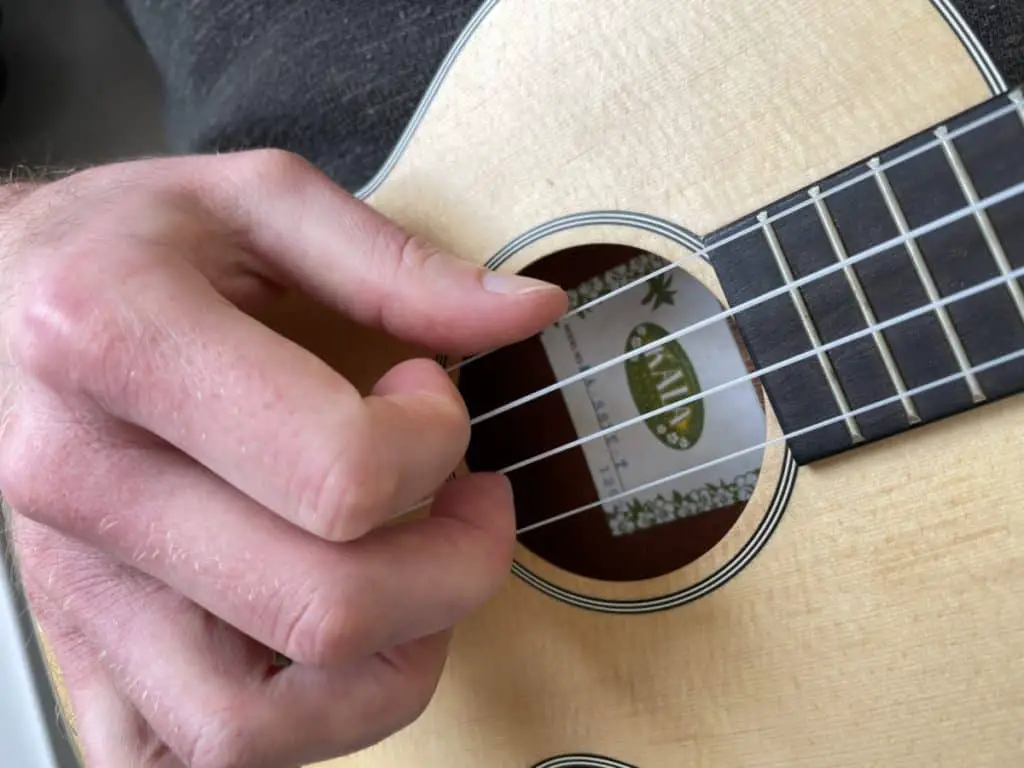
Physically and emotionally, guitars are harder to play at first. This is because your fingers have to adapt to greater stretches and applying pressure to heavier steel strings. You will have to build calluses and muscles and this simply takes time no matter what.
You will get hand cramps. You will get frustrated. Your fingers will be sore. And to make matters worse, during the learning process strings will buzz and mute and nothing will sound quite right.
Ukulele allows you to dive right in! There is still an adjustment period and you will still experience finger discomfort and have to build up light calluses. But within minutes of starting, you’ll be able to play simple songs relatively painlessly. This will feel good and you’ll be inspired to keep going.
Feeling rewarded for your efforts right away makes you more likely to stick with it and less likely to get discouraged and quit playing. And this is reason number one to play ukulele before guitar!
While it might seem like no big deal, the importance of immediate encouragement cannot be discounted! The guitar is known for having a relatively steep initial learning curve and takes a little more time to become fun.
2. The Ukulele is Less Intimidating
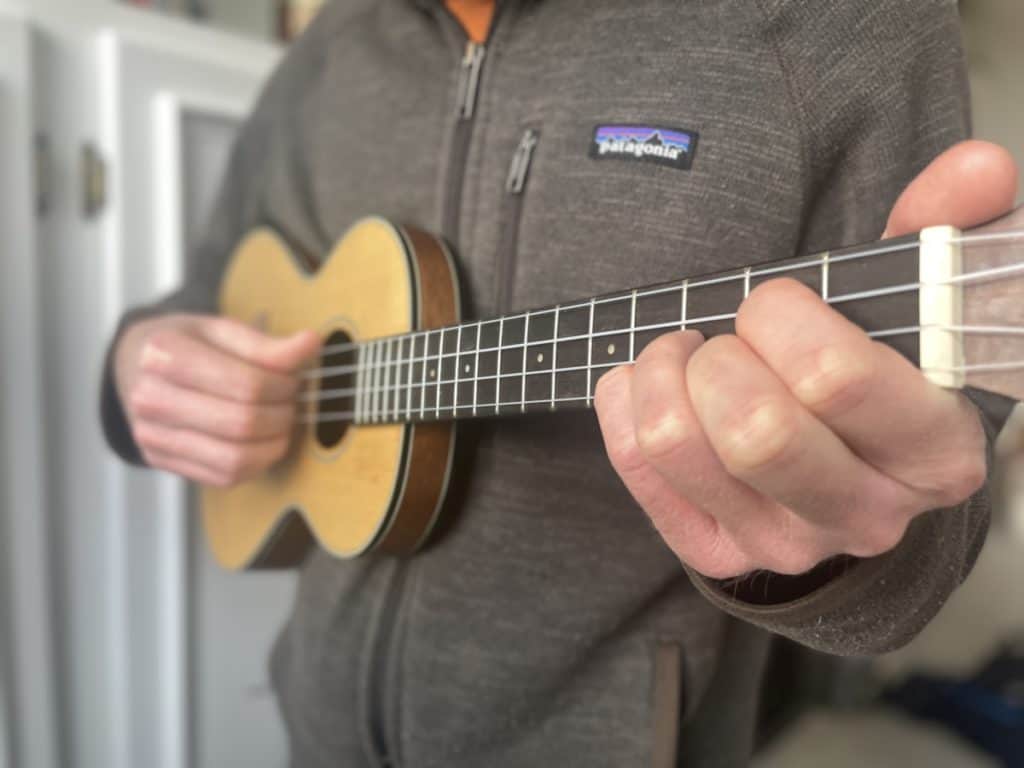
The guitar has a certain mystique about it. Describing that mystique often includes words like “difficult,” “daunting,” and “intimidating.” The guitar is serious business.
The ukulele is none of these things! It is often referred to as “happy,” “fun,” and “mellow.” Sometimes it is even called a toy. And what do you do with a toy? You play with it!
The ukulele has a reputation for not being taken too seriously. Why does this matter? Because playing the ukulele comes without pressure!
Psychologically speaking, people are more inclined to mess around on a ukulele without judgement. And there’s another term for “messing around” – practicing!
Having the desire to pick up an instrument and play is half the battle! If you have fun whenever you pick your uke up, you’ll be more likely to do it again. And again.
Ukuleles are the definition of fun! And any instrument you are excited to play is more likely to facilitate joyful learning.
As a bonus, ukuleles intrigue people. While guitars are a dime a dozen, ukuleles are considered more exotic. Their small size and unique voice are sure to attract attention!
3. The Ukulele is More Forgiving
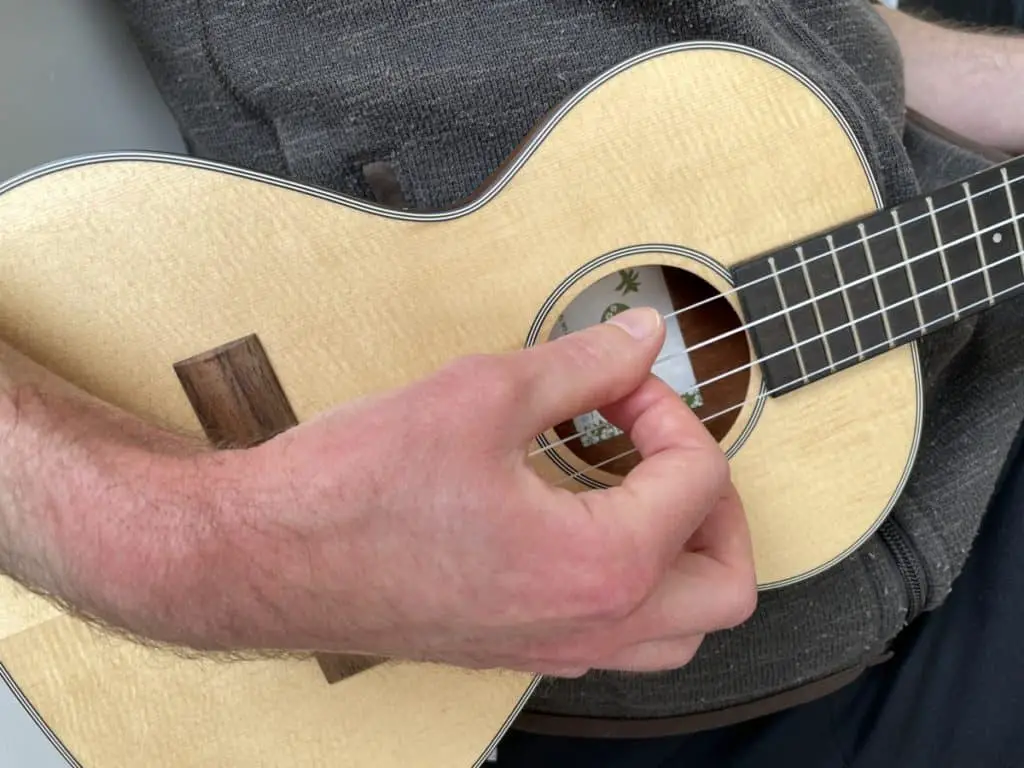
Learning a new skill takes time and effort no matter what. But it definitely helps to have a little extra encouragement along the way.
The ukulele is an inspiring and gentle teacher. And this makes playing immediately rewarding.
Most popular songs adapt well to the ukulele and can be learned in minutes once you have the basic chords down. The notes and chords themselves require less thought and are easier to fret.
The sounds you produce on a uke are typically pleasing – there are less string buzzes and loud off notes compared to the early stages of guitar playing. No matter what your goals are, this is a major selling point.
Because of its smaller body, the ukulele simply cannot project as much volume and is therefore quieter than an acoustic guitar.
As a bonus, the ukulele’s natural voice is mellower and warmer, and the sound it produces even when strummed on accident is pleasant.
The quiet and calming uke makes mistakes less noticeable and jarring. This means practicing is less embarrassing and frustrating for you (and more tolerable for others who happen to overhear).
Being able to produce pleasant sounds with your instrument right away without judgment or embarrassment is definitely very encouraging!
4. Skills are Transferrable Between Ukulele and Guitar
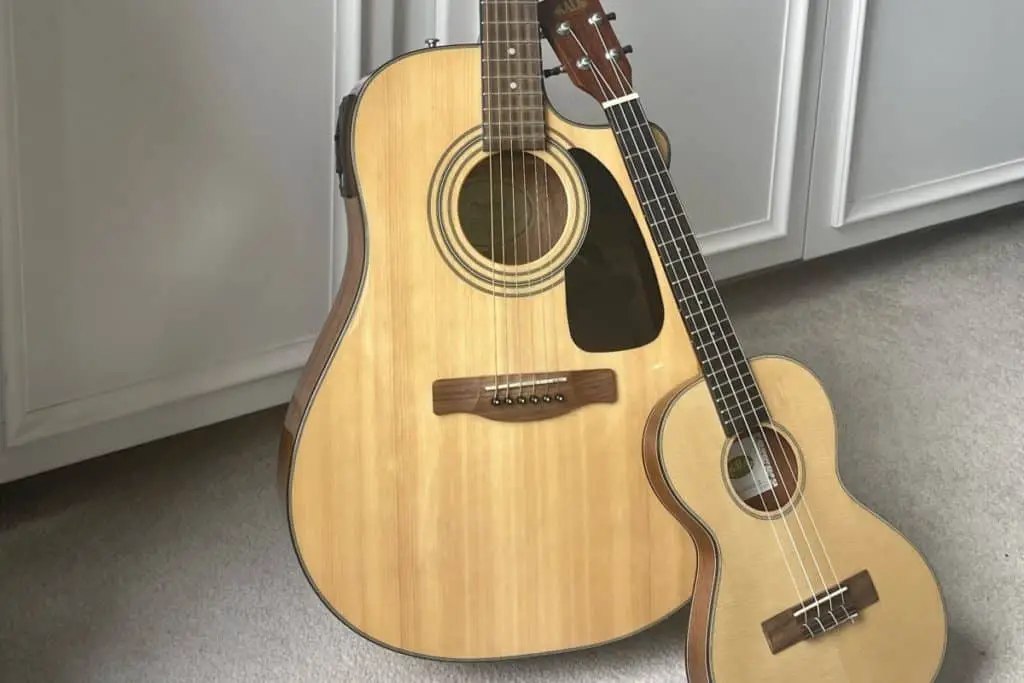
The guitar and the ukulele are similar instruments that utilize the same fretting and playing styles. The majority of what you learn on the ukulele translates to the guitar in some way.
By starting with the ukulele first, instead of, say, the piano, you will be learning the basic fundamentals of a fretted stringed instrument. The act of using your fingers to fret notes and chords works the same on both ukulele and guitar.
You will already be developing finger dexterity, calluses, and muscle memory with the uke. When you move to the guitar, you will be building on these skills – just adding two more strings to the mix.
While you will finger notes and chords differently on the guitar, the relative position of notes on the fretboard is the same. You won’t be learning it all from scratch while adjusting to a whole new instrument.
Playing the ukulele will train your ear. The sounds you hear on the guitar will be the same as you have heard them on the ukulele, just with slightly different tonal qualities and pitches.
For example, an A note will still sound like an A note and a C chord will still sound like a C chord. You would be surprised at how much this helps!
Whether you read music conventionally or use tablature, this ability also transfers over to the guitar. One more thing you don’t have to learn while tackling a new challenge!
All ukulele hand techniques work just as well on the guitar. If you’ve learned hammer-ons, pull-offs, slides, barre chords, fingerstyle plucking patterns, strumming patterns, or bends on the ukulele– guess what? You can now do all of these on the guitar!
Note: If your ultimate goal is to use the ukulele as a stepping stone to the guitar, consider starting on a baritone ukulele. Baritone ukes are tuned exactly like the smallest four strings of a guitar. Soprano, concert, and tenor ukuleles use re-entrant tuning which is a little different from the linear guitar tuning.
5. The Ukulele is Less Complex
Ukuleles have less going on and are a great way to start learning the ropes of general music theory concepts without inducing panic.
Ukuleles only have four strings while guitars have six. This means there is less to think about when you are first learning to place your fingers on the strings in the patterns necessary to make notes and chords.
Many ukulele chords only require you to fret 2 strings, and some chords only require the use of 1 finger! Guitar chords typically require the correct placement of three or more fingers.
For example, here is how you play the C chord on a ukulele:
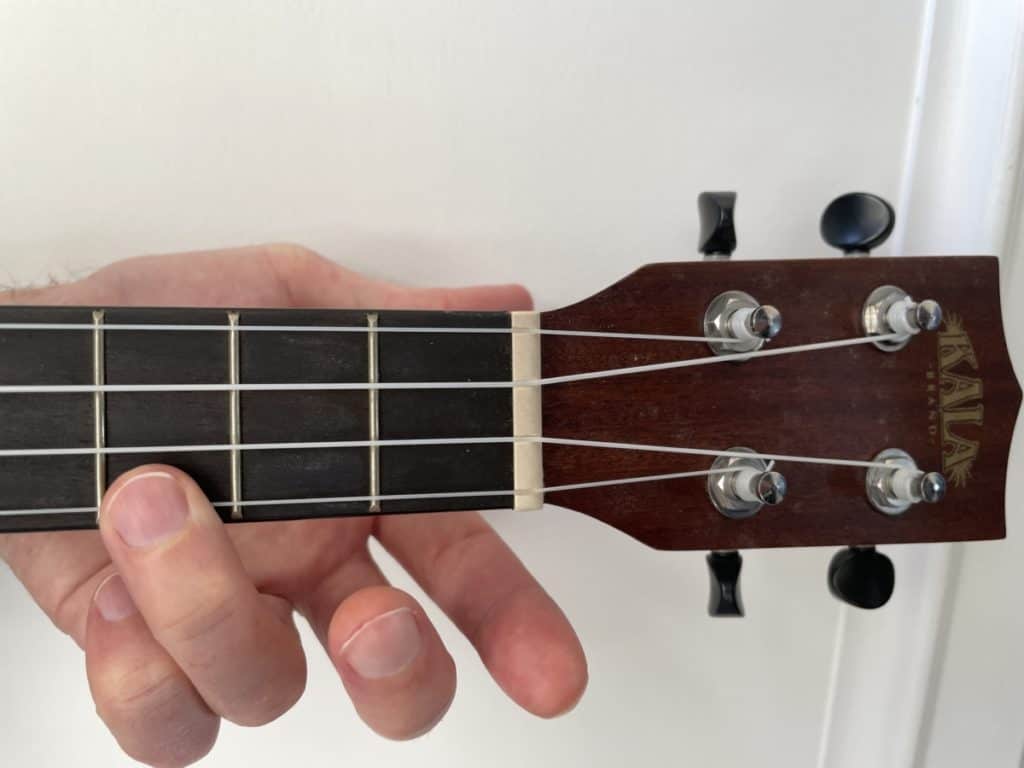
And here’s how to do it on a guitar:
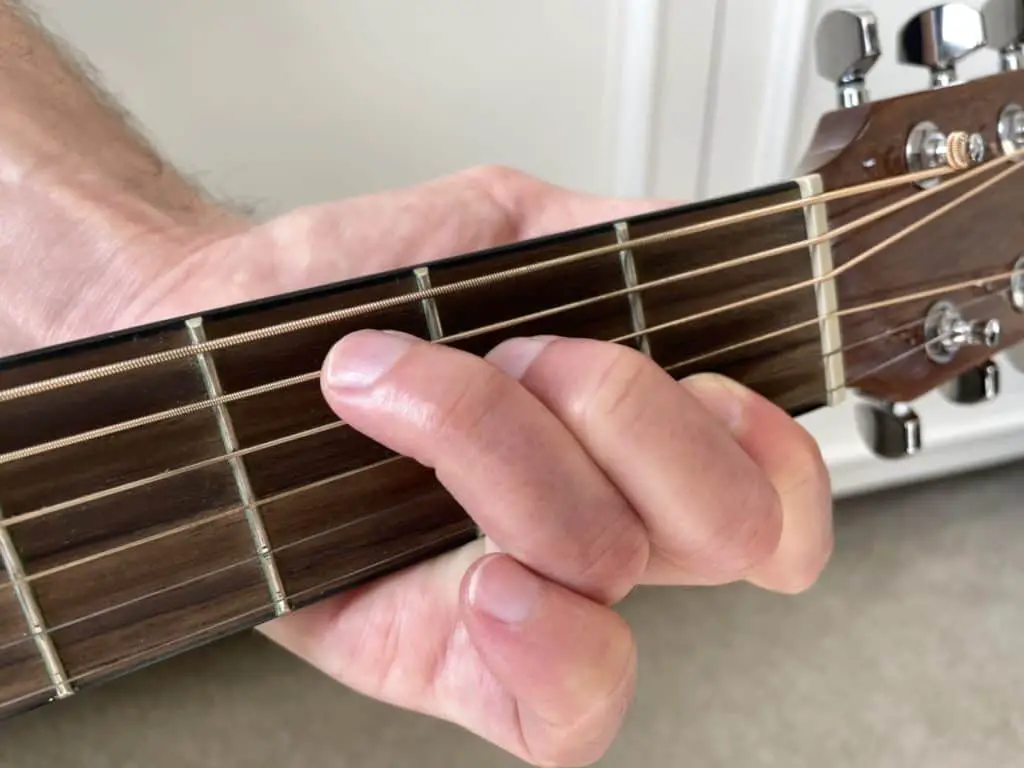
WAY different, am I right!?
And yes, I admit, this is an extreme example. But, it does get the idea across.
Strumming also takes less intense focus on a ukulele. Many guitar chords require you to skip certain strings when strumming. For example, when playing a D chord on a guitar you do not strum the thickest two bottom strings.
On the ukulele, you just strum all four strings no matter what.
When you are a beginner, the basics are challenging enough. It helps to have less to think about!
6. Ukulele Strings are Gentler
Compared to a guitar, fretting strings will be easier and less painful on a ukulele. You will still experience a little discomfort at first and will still develop calluses. But you will be too busy rocking out to feel much pain!
Most guitars are strung with steel strings and all guitars have greater string tension than ukuleles due to their longer scale lengths. This means the strings of a guitar are harder to press down, or, fret.
There’s no way to sugar coat it: smashing a thick steel guitar string against wood with your tender beginner’s finger pad is going to hurt.
In time, you will develop calluses and playing will stop being painful. But this initial suffering period often discourages beginner guitar-players from continuing.
Ukuleles are strung with softer materials. Nylon, nylgut/nyltech, and fluorocarbon are all much gentler on the fingers than cold hard steel. In addition, the string gauges are smaller which means there is less to press.
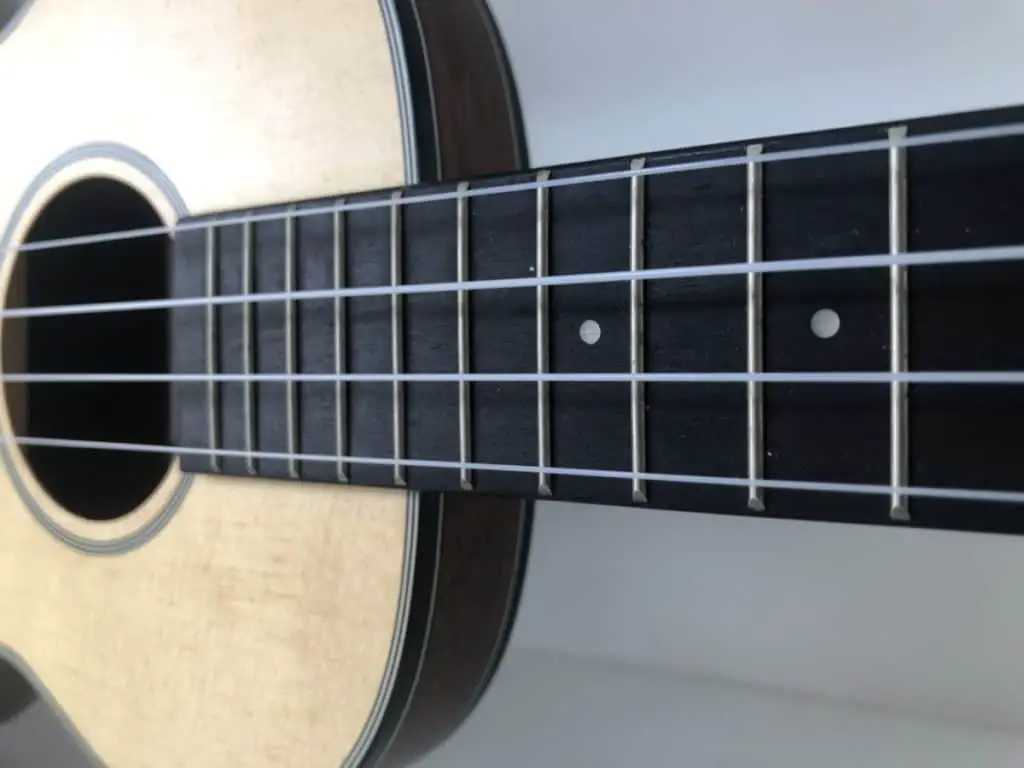
Ukulele strings carry three times less tension in them than guitar strings. This means that you won’t have to smash the strings, and your fingers, into the fretboard as hard to produce the desired notes.
All of this translates to less pain and more gain. You will be able to fret notes easier in the beginning, and you will experience less string buzz.
Playing chords and having it work out is rewarding and will inspire you to keep going!
7. Everything is Smaller on a Ukulele (Including the Struggle)
Bigger is not always better. In the world of fretted instruments, smaller can be very helpful, especially in the early stages of learning.
Ukuleles have smaller bodies and shorter, thinner necks. They also weigh less. All of this is ideal for beginners for several reasons.
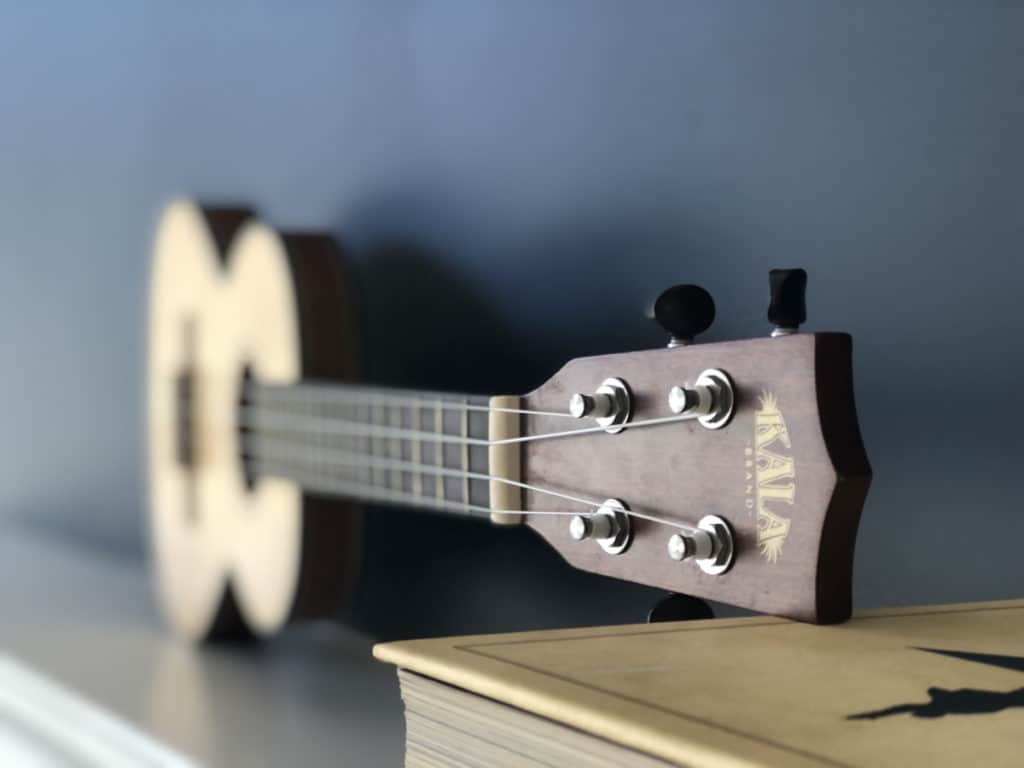
When playing a stringed instrument, you must press the strings against the fretboard with your fingers. This requires you to grip the neck and press down while keeping your wrist at an ergonomically desired angle.
The thinner neck of the ukulele makes it easier to correctly position your fretting hand with your fingers pointed down above the strings. This reduces wrist tension, which is very important for safe and efficient playing.
Compared to guitars, ukuleles also have much shorter scale lengths. Without getting too technical, this means that the frets are closer together and the strings carry less tension.
All of this is beneficial for beginners because your hands will have to do less stretching, both vertically and horizontally, and playing will be much easier right away. You will experience more self-encouragement and less hand cramping. Even the dreaded barre chords will be easier!
A ukulele weighs less than a guitar and is less bulky. For most people, that makes ukes easier to hold. This allows you to play longer without getting uncomfortable which encourages more practice!
Its small and light physique also makes the ukulele more portable, which means you will take it out and play it more. Unlike guitars, ukes can be played in very tight spaces – including the car!
This grab and go aspect is a huge selling point for the ukulele and creates opportunities for playing any time you have a spare moment. Being able to practice frequently will help you learn faster!
Ukes take up less physical space, which can also make them a better option if you don’t have much storage capacity. If you are living in a dorm or are confined to a single room, a ukulele is ideal.
The biggest ukulele is still smaller than the average guitar. With a few notable exceptions, like the violin, the smaller the stringed instrument, the smaller the struggle to play it. This is part of the reason half-sized guitars are becoming so popular!
Note: If you have larger hands and are worried about the small size of a ukulele, fear not! Ukes come in several sizes. Consider a tenor ukulele, which will give you more finger room per fret.
8. The Ukulele’s Price is Nice
Because guitars are bigger, they require more materials to produce. As a result, there is no beating the price of the smaller ukulele! And this is especially important for beginners.
You should always buy the best quality instrument you can afford when starting out. The better your instrument sounds and more reliably it stays in tune, the more enjoyable it will be to play.
Generally speaking, ukuleles cost less than guitars of equal caliber. A decent starter ukulele runs about $50-$100, while a starter guitar is more in the range of $200 and up.
You will always get more ukulele for your buck. If you spend the $200 you would have spent on a starter guitar on a uke, you will treat yourself to a higher end ukulele.
Finally, the smaller up-front cost contributes to the ukulele’s reputation as being less daunting. You will experience less stress about damage and less self-judgement if you don’t stick with it. A guitar always feels like a larger investment!